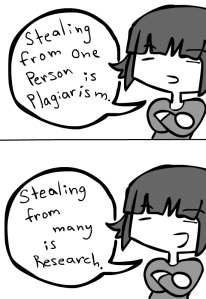This was the topic that I picked out from my teacher’s hand when were choosing topics for our Public Service Announcement (PSA) project.
Overall, it was an interesting choice. I’ve known about the evils of plagiarism since way back. However; I was certainly surprised when I found out that like all things, this certain evil has also evolved, transforming itself to fit into the digital age.
Online plagiarism now exists.
Now, I’m not talking about the kind of plagiarism where lazy students go to Wikipedia and copy everything and pass it off as “research”.
Nope, even that is old school.
What we have here; ladies and gentlemen, is a new kind of breed. A new evil that really does boggle the mind and would make you want to scratch some people’s eyes out.
Apparently, there are those who copy ideas from another person’s blog and paste it in their own blog, and passing them off as their own. Like the traditional plagiarism, they do not say where they get this information from. There are also instances where people copy information from a website (without citing it!) and placing it in a blog or another website.
There are hundreds of bloggers who have experienced this kind of stealing. They are all indignant and frustrated since there are actually no laws prohibiting such actions. Until now, there are a lot of frustrated online writers who see their words in a page that is not their own.
Implication to Organizational Communication?
Naturally, this new kind of plagiarism has an implication to the academe, not to mention the online community. Academic institutions must redouble its watch for plagiarism. Not only should they keep an eye on it in papers, but in the digital avenues as well (especially when instructors require digital outputs, ahem).
It is interesting to see that as society translates itself digitally (through online communities, social networks, etc.), social problems are also able to squeeze itself in. Plagiarism is not the only one, but it does show the gravity of the situation. The internet has counterparts of actual social problems. Aside from online plagiarism, we also have online bullying, online stealing, online whoring. What’s next, a monopoly of rice in Farmville?
This only goes to show that when venturing into digital avenues, we have to be wary of how existing problems, not only in society, but in organizations as well. We must remember that as we enter the digital world, we do not enter it in a clean slate. There is no tabula rasa, we carry with us the same problems and issues into whichever field we may choose to go.





It’s good that you pointed out that anywhere we go, in whatever field or media platform there are problems present. Sometimes people forget that, and blame every bad thing on the internet.
It is just disturbing how these social problems translate themselves in the world wide web. And while people are talking about who bullied who online, we must also focus on what is happening in real life. What is happening online is just the tip of the iceberg.
As for online plagiarism, the vastness of the world wide web makes plagiarizers confident that they would not be caught. As far as I know, there are now some mechanisms that instructors can use to trace the sources of these works. Whether online or not, plagiarism is still plagiarism. Idea thieves, beware.
I definitely agree KC! 🙂 Plagiarism is plagiarism no matter how it transforms, it is still plagiarism. Although some of our professors use software to detect plagiarism, I believe that there is still a great number of profs that do not use/know how to detect plagiarism made over the internet. So what does it mean? As future communication specialists, we should be vigilant and proactive in fighting plagiarism.
I know a fantabulous writer who just got plagiarized online.
Lucky her she found out about it but how about the hundreds of writers out there who have zero idea that their works are being plagiarized?
It’s sad that some people get recognition at the expense of another’s work. I agree that this calls for some serious action. If it would mean security to ban the copy-paste function on every published blog online then be it! Google Books is doing this measure in accordance with the Copyright Law. It’s about time such an action is made available for bloggers.
I know the feeling of being plagiarized online. The person who plagiarized me was somebody I knew and I got really angry because of what that person did. What I don’t understand regarding this incident were the reactions of some of my acquaintances when they found out that I got mad. Most of them think that I was over reacting. I was disappointed because they didn’t understand that it was intellectual property right and that person shouldn’t have copied my idea. I guess the problem here is that UP is the only one strict and serious about plagiarism. Other students don’t view plagiarism the way we do. I seriously hope that other universities teach their students about ethics too.
The internet promoted the copy-paste society! As a result, hello lazy students and employees. Now, I can say that plagiarism is everywhere. I believe that the government should strengthen laws addressing plagiarism and copyright infringement. I honestly don’t know how but I think they should work on that.